Meet the State Exec: Brian K. Wood
BY AsphaltPro Staff
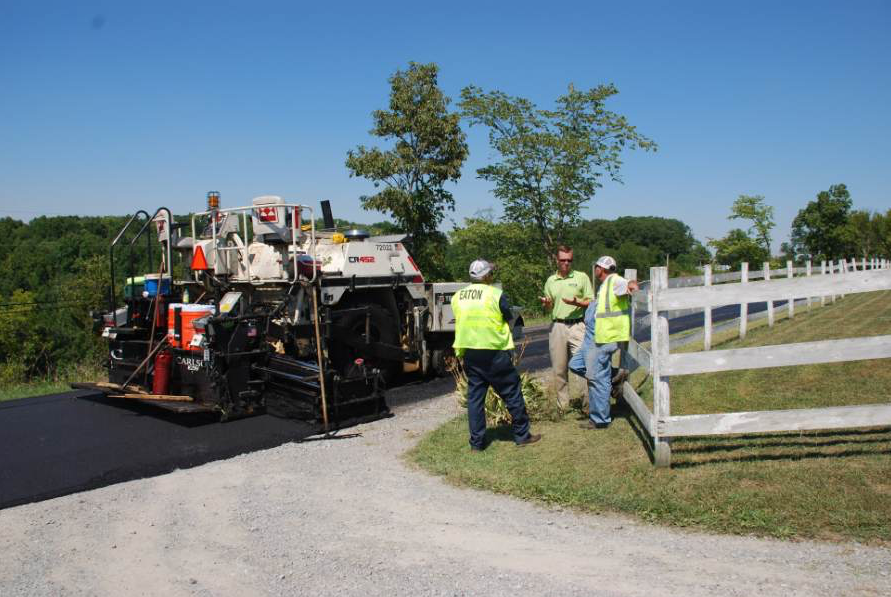

Project visits are part of the job of the state executive director. Here Brian Wood discusses the finer points of a project with the Eaton crew in the field.
In a new feature for 2015, AsphaltPro Staff introduces you to the state asphalt pavement association (SAPA) executive directors. We’re starting with Brian K. Wood, the chairman of the 2014-2015 SAPA directors. Wood has been a great resource for common sense, best practices information to share with the asphalt industry since AsphaltPro’s inception and it’s a pleasure to share some of his insight again. He’s served as the director of the Plantmix Asphalt Industry of Kentucky (PAIKY), Frankfort, Ky., which was formed in 1938, for nine years.
Full Name: Brian K. Wood
How long have you been in the asphalt industry? 14 years
Do you have a degree related to the industry? Bachelors and Masters in Civil Engineering from the University of Kentucky. When I was first shown how to run an asphalt extraction/gradation test, we burned off the asphalt by throwing a match into a metal bowl and watching it ignite!
How many producer and/or contractor members are in PAIKY? 31
Our membership represents about 95% of all the tons produced each year. I was very fortunate that my predecessor (Dean Blake) had done a wonderful job of uniting the industry around our trade association.
What is your favorite method for recruiting new asphalt professionals to the industry in general? And why? We regularly speak to the students at University of Kentucky, University of Louisville and Western Kentucky University while in their upper level asphalt/materials courses and try to increase their awareness and interest in the asphalt industry.
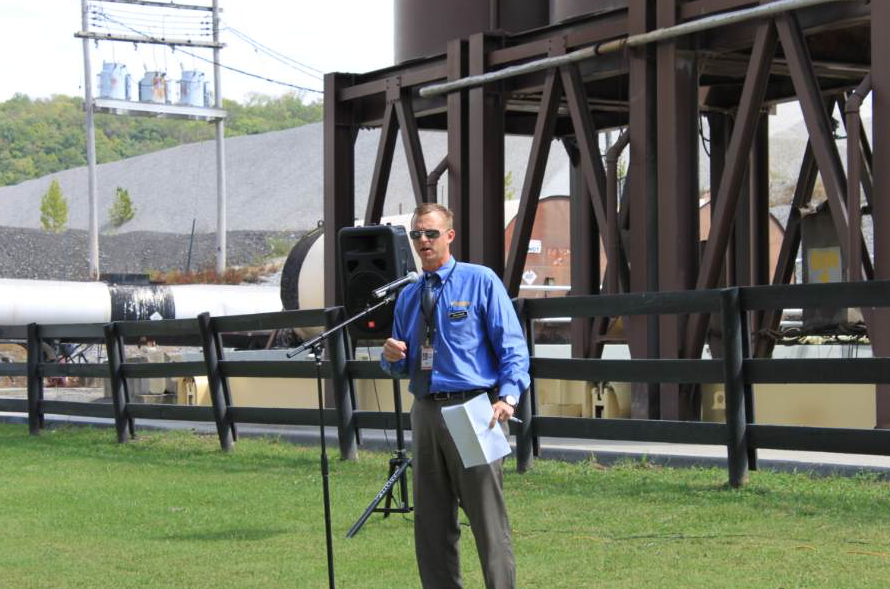
Here Brian Wood introduces the activities planned for the H.G. Mays plant tour.
When do you hold your annual meeting? Our Winter Training School is typically held in February. We host a summer meeting as well but typically not stand-alone seminars.
Do you have a trade show/expo in addition to your annual meeting? Yes, however, we only allow our associate members to exhibit (membership has its privileges). We are a 3-person office and with such a small office, it takes all hands on deck to pull off a meeting of 500 to 600 attendees.
About how many member asphalt projects do you visit per year/paving season? 10+
About how many member asphalt plant tours do you assist/are you a part of per year? 5+
About how many member asphalt open house events do you attend per year? 1
About how many state agency or DOT meetings do you attend per year? 3
On a scale of 1 to 5 (1 being none at all; 5 being very much), how much of a threat to your members’ marketshare/livelihood is the concrete industry in your state? (5) We feel like it is a big threat here given the aggressive marketing tactics from the concrete industry.
The concrete industry formed a chapter of the ACPA here over a decade ago with the sole purpose of taking away market share. They have previously introduced and attempted to pass legislation that would mandate their version of life cycle cost analysis.
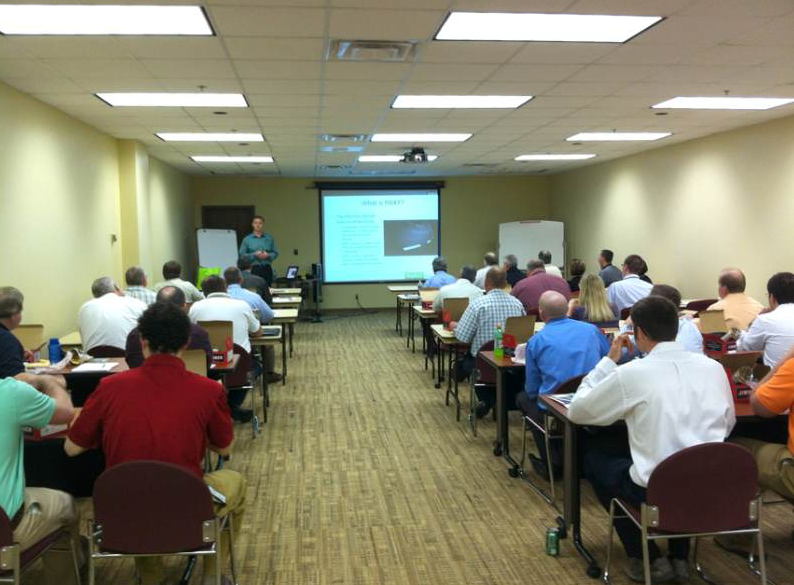
PAIKY doesn’t typically host stand-alone seminars, but lunch-and-learn sessions give members a chance to brush up on new information.
On a scale of 1 to 5 (1 being none at all; 5 being very much), how much difficulty are your members having in finding qualified workers for their asphalt paving or production crews? This isn’t a huge issue here yet but we all see the trend developing in the years ahead. If we see a significant uptick in the economy, we are likely to experience that phenomenon as soon as that happens.
On a scale of 1 to 5 (1 being none at all; 5 being very much), how involved are your state elected officials in transportation issues such as funding and infrastructure improvements? (5) Funding for infrastructure is a top priority of our association and we have made a much better effort in recent years to be politically active on this issue.
On a scale of 1 to 5 (1 being none at all; 5 being very much), how involved are your asphalt members in transportation issues such as funding and infrastructure improvements? (5) Our members stay very engaged in the political process.
Could you share an example of a time when your state APA hosted elected officials to educate them on the need for highway funding OR asphalt materials OR construction work force development, etc.? We have hosted plant tours for our transportation committee members in the Kentucky General Assembly as well as members of Congress.
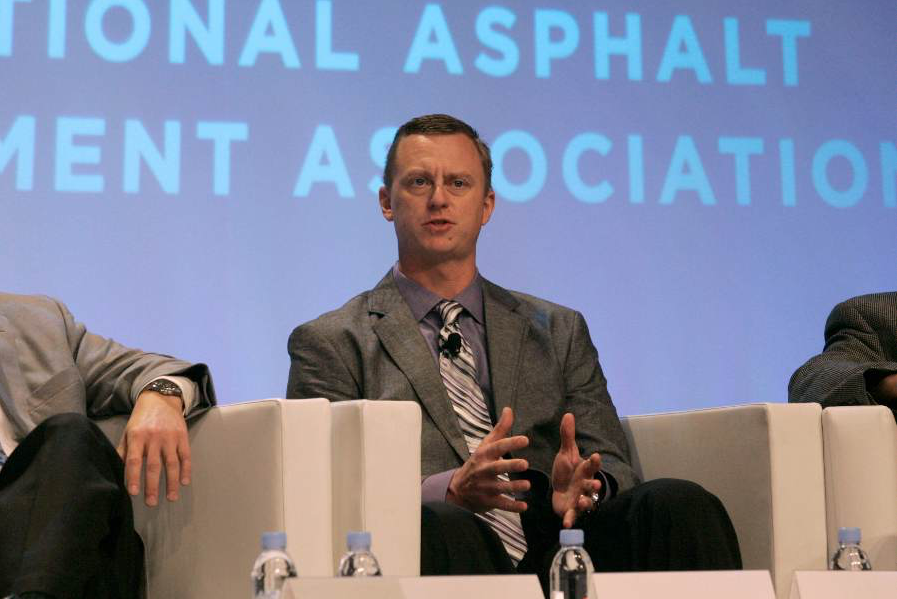
Here Brian Wood joined other state execs and NAPA staff to discuss the marketing moves for the asphalt industry. These two photos courtesy of NAPA.
Get to Know Brian Wood
Why (or how) did you join the asphalt industry? I was active in student associations while in college – serving on boards and volunteering to organize meetings, events and speakers. When I saw this position advertised, it occurred to me that I could actually get paid to do that for a living!
What do you see as the most important part of your job as an executive director of a SAPA? Advocacy. My role is to represent the industry, promote the product, and help steer agencies, legislation, and regulations in a direction where asphalt is preferred and where our members can be most successful.
What is the most challenging part of your job, and why do you think it’s a challenge in your state (or in this economy or in this industry, etc.)? The economic downturn has been difficult. When production is low and members working harder for fewer tons, more problems tend to bubble to the surface. High water covers a lot of stumps and I look forward to the day when the economy recovers and our elected leaders also provide us with a long term plan for ample and stable highway funding.
What do you find most enjoyable about your job as an executive director of a SAPA? The people. I really enjoy working with (and for) the company owners in this state and find it very rewarding when I can help them on issues that contribute to the success of their individual businesses.
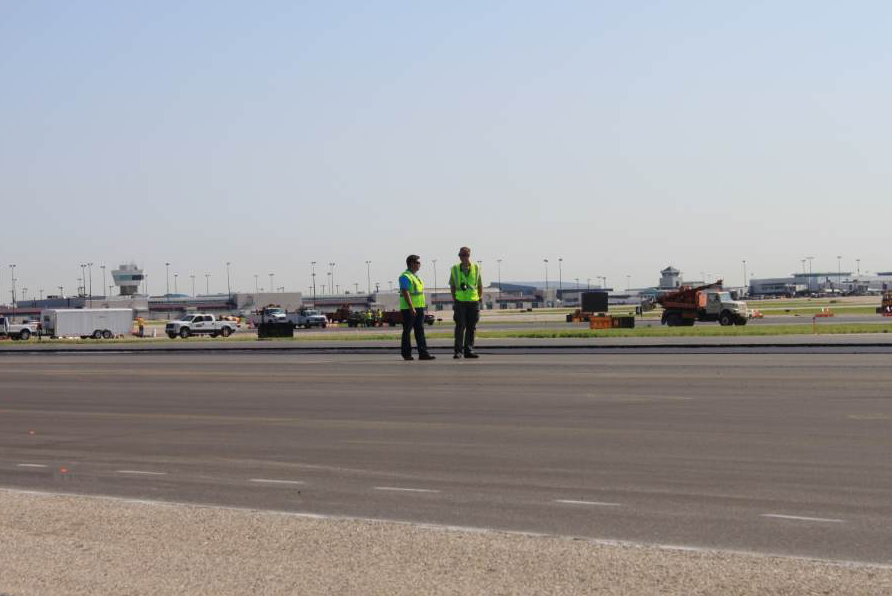
PAIKY Executive Director Brian Wood checks out the asphalt work at the airport.
